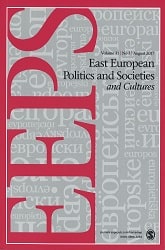European Union Gender Regulations in the East: The Czech and Polish Accession Process
European Union Gender Regulations in the East: The Czech and Polish Accession Process
Author(s): Leah Seppanen AndersonSubject(s): Gender Studies, Human Rights and Humanitarian Law, Civil Society, Political history, Gender history, Social development, Social differentiation, Transformation Period (1990 - 2010), EU-Approach / EU-Accession / EU-Development, Sociology of Politics, EU-Legislation
Published by: SAGE Publications Ltd
Keywords: European Union; Poland; Czech Republic; equal opportunities;
Summary/Abstract: This article explains, first, why there was a uniform emergence of equal opportunities legislation across East Central European states in the late 1990s and early 2000s and, second, why the speed of adoption varied across countries. The author deviates from a traditional comparative focus on domestic factors and instead treats her two case studies—Poland and the Czech Republic—as part of an international system in which external actors can exert a simultaneous but differential effect on domestic policies. The author argues that the European Union (EU) accession process prompted equal opportunities legislation in both countries but domestic actors mediated this influence in different ways. In Poland, legislation was delayed due to an organized opposition to EU gender equity laws and its close ties to parties of the Right in government, two factors absent from the Czech case where laws passed earlier. The author also suggests that the EU’s financial and political resources may enable it to reshape these domestic actors in the future.
Journal: East European Politics and Societies
- Issue Year: 20/2006
- Issue No: 01
- Page Range: 101-125
- Page Count: 25
- Language: English
- Content File-PDF

